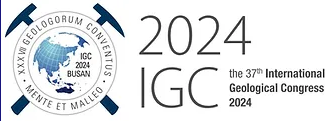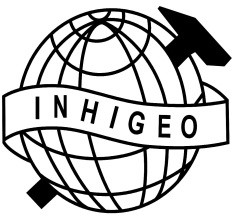

Dear Colleagues,
the International Commission on the History of Geological Sciences (INHIGEO) will hold its 49th Annual Symposium in association with the 37th International Geological Congress (IGC 2024) taking place on 25 - 31 August 2024, at BEXCO Congress Centre, Busan, South Korea.
Presentations are welcome under the themes of the INHIGEO sponsored sessions that are proposed (see below) within the scientific programme of the Congress. It is not required to be INHIGEO member.
Below you can find the detailed outlines of each INHIGEO sponsored session on the IGC 2024 website (https://www.igc2024korea.org/content/14403) and a list is of funding sources and grants available
Abstract submission at the website https://www.igc2024korea.org/content/14410 Extended Deadline: 15 March 2024
For more information, please visit https://www.igc2024korea.org/
Hoping to see many of you in Busan, with very best wishes
Ezio Vaccari & Martina Kölbl-Ebert
INHIGEO President INHIGEO Secretary-General
INHIGEO sponsored sessions
Under T27: Geoheritage, Geoparks, and Geotourism
Session 3: Geosites and Georoutes in the history of geological sciences
(chaired by Ezio Vaccari and Martina Kölbl-Ebert)
The comparative study of geosites and georoutes of historical relevance is of great importance, because it contributes significantly to recognize and understand the foundation, the development and the potential of the geological sciences, as well as their role in human society. The historical geosites and georoutes are not just places with a history, but places that have made history in the field of the geological sciences. In these sites and itineraries the observations of some specific features determined new ideas, theories and interpretations which have changed human understanding of the geological phenomena. It is evident that the historical geosites and georoutes are landmarks for the history of science, as well as milestones for modern geology. In fact, the history of geosciences, from Antiquity to the Contemporary Age, is based not only on archival documents and printed material, but also on places, routes and landscapes, which have been described, studied and interpreted since the origins of the science of geology, in particular between the 18th and the 19th century. The increase of scientific travels and the emergence of fieldwork, from the 18th century to the present day, has defined and identified not only places, but also wider regions which, when preserved and still visible today, can become geosites or groups of geosites within an area with geohistorical value. Most of these sites, described in the geological literature, in particular between the 18th and the 19th century, can be considered the cradles of the modern geological fieldwork and the birthplaces of new ideas on the history of the Earth, as well as the sources for the history of the methodology of observing, sampling, representing and describing geological features in the field. The original routes of this early fieldwork, which took place during several travels and excursions in the past, can be reconstructed by the historical research and in some cases can be repeated in geo-historical fieldtrips (Johnston & Taylor, 2017). The importance of this "re-treading" of the early geological fieldwork has been recently emphasized by Martin Rudwick (2022) and its potential for possible new forms of geotourism (Vaccari 2016) can be now regarded as highly significant, in particular for the benefit of the growing network of the Geoparks. The aim of this session is to invite papers from different perspectives in sciences and humanities, in order to present and compare case studies regarding places and routes, particularly (but not exclusively) in the history of geological fieldwork, within an interdisciplinary framework including the history of geosciences and the geoheritage, also in order to discuss the definitions and the roles of historical geosite and historical georoute. This session is sponsored by the IUGS International Commission on the History of Geological Sciences (INHIGEO).
Under T38: Anthropocene
Session 1: Anthropocene, History and the Geosciences: contribution to the contemporary debates
(chaired by Claudine Cohen, Ernst Hamm and Andrea Candela)
The concept of Anthropocene, as a possible new geological epoch to describe the most recent period in Earth’s history when anthropic activity has begun to exert a significant impact on Earth’s climate, geology, and ecosystems, has been widely discussed in recent years not only within the community of geologists, and in particular in the field of stratigraphy, but also among historians, philosophers, earth systems scientists, ecologists, sociologists, economists as well as politicians. Needless to say, the idea that there can be a unit of geological time where the anthropogenic footprint is clearly detectable, has encouraged lively debates among historians of science and technology, who have always been interested in the scope, meanings and effects, even from an environmental point of view, of techno-scientific and industrial processes. It is now a matter of fact that this very interdisciplinary topic has gradually attracted a growing interest worldwide from the media, the general public and even policymakers, as it is directly linked to the issue of the global emergency of climate change. The notion of Anthropocene aims at highlighting the potential role as a major geological agent acquired by humankind over the 20th century, at the time when the “fossil fuels economy” has become globally established. Therefore, on the one hand, geosciences have been focusing on identifying the stratigraphic markers and the geological proxies of this new epoch. Indeed, a working group on the Anthropocene has been established within the Subcommission on Quaternary Stratigraphy. However, on the other hand, historical disciplines, and more specifically the history and philosophy of science, have recently launched a variety of studies on the genesis, historical genealogies and development of the Anthropocene event and concept. The research in history of geological sciences can provide, in many ways, useful contributions to the current debate on the history, definition and possible establishment of the new epoch called Anthropocene. In fact, several classic studies in the historiography of the Earth sciences have been focused on the scientific, philosophical and socio-political contexts of the definition of new geological epochs from the 19th century to date. Moreover, the history of geosciences can help shed light on the interactions between geosphere and anthroposphere from a historical perspective. It can then help to reconstruct the history of those theories of the Earth, especially as a complex system, in relationship with the recent notion of Anthropocene. The aim of this session is to invite papers from different perspectives in sciences and humanities, in order to contribute to define the concept of Anthropocene and evaluate it within the history of geosciences. This session is sponsored by the IUGS International Commission on the History of Geological Sciences (INHIGEO).
Under T40: History of Geological Sciences
Session 1: History of women in geology: trailblazers, leaders and those in the shadows
(chaired by Kathleen Histon and Martina Kölbl-Ebert)
Since the 18th century women have been pioneers in a broad spectrum of geoscience disciplines, however, their achievements have not always been recognized. In this INHIGEO sponsored session we wish to highlight their important roles over three centuries and welcome presentations on the history of the trailblazers, those who excelled in research; the leaders, i.e. those who held important positions such as in the IUGS, IGCP, national surveys, industry, museums, academic chairs in geology etc., and in particular those in the shadows, their contributions often unacknowledged or even forgotten, the women who, e.g., worked alongside their male colleagues as assistants or flanked their husbands’ research as illustrators and in preparation of specimens. By reconstructing their history, their roles and the obstacles they encountered within the development of the geological sciences across a broad geographical, social and time context we may provide lessons for the future and role models for the geoscientists of the 21st century. This session is sponsored by the IUGS International Commission on the History of Geological Sciences (INHIGEO).
Session 2: History of geoscientific travels in Asia and beyond
(chaired by Ezio Vaccari, Toshihiro Yamada and Carol Bacon)
The development of the geosciences, has always been closely associated with travel, especially dating from the 17th century onwards, when expeditions to explore unknown territories and seas by surveyors and scientists also brought opportunities to compare and contrast scientific findings and theories based on such observations on a global scale. Taking the main theme of the 37th IGC "The Great Travelers: Voyages to the Unifying Earth", this INHIGEO sponsored session invites presentations related to geoscientific travels that focused on Asia, but not exclusively, as travel and exploratory expeditions across all the continents from the Americas, Africa, Oceania and Europe can be also presented and discussed in a comparative way. These travels, covering a wide range of enterprises including geography and geophysics from ancient to modern times, are an invaluable source of knowledge, methods and objects that still require study and careful interpretation in relation to the influence and role these travels played in the development of the Earth sciences and in particular on the establishment of various practices of geological fieldwork through the centuries. This session is sponsored by the IUGS International Commission on the History of Geological Sciences (INHIGEO).
Session 3: General contributions to the history of geological sciences
(chaired by Martina Kölbl-Ebert and Ezio Vaccari)
This session aims to provide a meeting space for research to be presented that highlights the different ways of interaction between history and the geosciences. Contributions are invited, also from the different fields of the Earth sciences, related to the history of the geosciences covering all aspects of research on historical documents, maps and publications, collections, museums, archives, libraries, geological institutions and surveys, the development of theories or techniques in the geosciences, scientific fieldwork, disputes and discussion, biographies and correspondence between scientists. Societal, geographical and temporal contexts in the development of the geosciences reveal critical historical insights and underline the importance of collaboration between the humanities and sciences in providing resources for public outreach and sustainability for the future of the geosciences within the society. The session is sponsored by IUGS International Commission on the History of Geological Sciences (INHIGEO).
____________________________________________________________________________________________________________________
Funding to attend the IGC 2024
Geohost Support Program
The GeoHost Support Program is designed to enable deserving geoscientists and geoscience students to participate in the International Geological Congress (IGC). See: https://www.igc2024korea.org/content/14400
INHIGEO Grants
INHIGEO will be able to support students, young scholars and INHIGEO members from developing countries without other funding sources with up to 6 grants amounting to 300 Euros each, provided they contribute to one of the above mentioned INHIGEO sessions. Students and young scholars do not need to be INHIGEO members. Please contact the INHIGEO secretary general for details:

